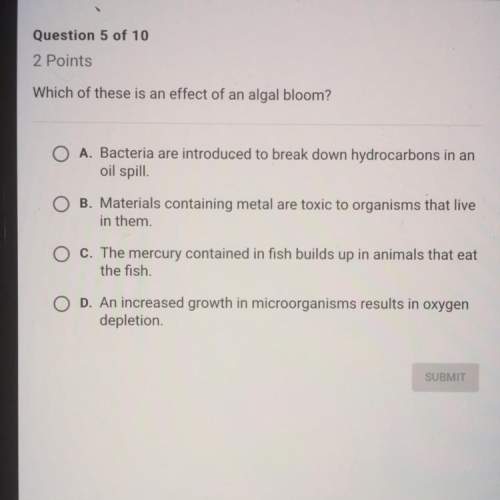
Biology, 02.09.2019 02:30 angieplasencia8
Suppose you are given a new temperature sensitive bacterial mutant that grows normally at 37 degrees c but cannot replicate its chromosomes properly at 42
c. to investigate the nature of the underlying defect, you incubate the cells at 42 c with radioactive substrates required for dna synthesis. after one hour you find that the cell population has doubled its dna content, suggesting that dna replication can still occur at 42
c. moreover, centrifugation reveals that all of this dna has the same large molecular weight as does the original dna present in the cells. when the dna is denatured, however, you discover that 75% of the resulting single stranded dna has a molecular weight that is half that of the original double-stranded dna, and the remaining 25% of the dna has a much lower molecular weight. based on the preceding results, what gene do you think is defective in these cells?

Answers: 1


Another question on Biology

Biology, 21.06.2019 22:00
Flock x flock y flock z total pieces of food eaten (from previous page) 147 93 60 food percentage* % % % simulated number of birds in flock for 3rd generation** * divide each flock's total pieces of food by 300, the total number of pieces of food eaten. ** multiply the food percentage for each flock by the total number of birds (30).
Answers: 1

Biology, 22.06.2019 05:00
(99 points) be serious! how do farts work? how do you fart without it stinking? serious answers only
Answers: 2


Biology, 22.06.2019 09:10
Hormones are chemical molecules produced by endocrine glands. one such endocrine gland is the thyroid gland, which synthesizes the thyroid hormone, which in turn affects the heart muscles. which two statements describe the probable reason for the function of the hormone? the cells in the heart have specific receptors that allow for the intake of hormones. the heart and the endocrine glands have the exact same types of cells. all cells make the same types of hormones. thyroid hormones show their effect on the heart by means of specialized cells. thyroid cells and cardiac cells have different dna.
Answers: 1
You know the right answer?
Suppose you are given a new temperature sensitive bacterial mutant that grows normally at 37 degrees...
Questions


Medicine, 14.02.2022 04:30

Mathematics, 14.02.2022 04:30

English, 14.02.2022 04:30

Computers and Technology, 14.02.2022 04:30

History, 14.02.2022 04:30




Mathematics, 14.02.2022 04:30



Mathematics, 14.02.2022 04:30

Mathematics, 14.02.2022 04:30

History, 14.02.2022 04:30




History, 14.02.2022 04:30

Mathematics, 14.02.2022 04:30




